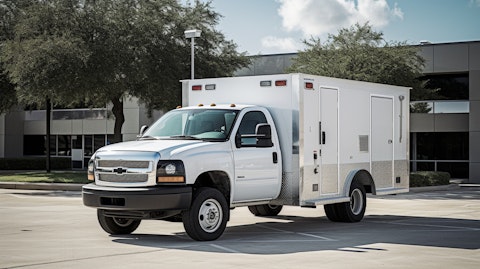Douglas Dynamics, Inc. (NYSE:PLOW) Q2 2024 Earnings Call Transcript July 30, 2024
Operator: Good morning and welcome to the Douglas Dynamics Second Quarter 2024 Earnings Call. All participants will be in listen-only mode. [Operator Instructions] After today’s remarks, there will be an opportunity to ask questions. [Operator Instructions] Please note this event is being recorded. I’d now like to turn the conference over to Nathan Elwell. Please go ahead.
Nathan Elwell: Thank you. Welcome everyone, and thank you for joining us on today’s call. Before we begin, I would like to remind you that some of the comments that we made during this conference call, including answers to your questions, will constitute forward-looking statements. These forward-looking statements are subject to risks that could cause actual results to be materially different. Those risks include, among others, matters that we have described in yesterday’s press release and in our filings with the SEC. Joining me on the call today is Jim Janik, Chairman and Interim President and CEO; and Sarah Lauber, Executive Vice President and CFO. Jim will provide an overview of our performance, followed by Sarah reviewing our financial results and guidance. After that, we’ll open the call for questions. With that, I’ll hand the call over to Jim. Please go ahead.
Jim Janik: Thank you, Nathan. I’m pleased to be back talking to you all today as Interim President and CEO following Bob McCormick’s retirement. On behalf of everyone at Douglas, I want to reiterate our gratitude to Bob for his dedicated service to the company over the past 20-years. As CFO, COO, and most recently President and CEO, we wish him all the best in his retirement. Now, many of you may already know me, but here is a reminder about my background for those who don’t. I joined the company in 1992 as Director of Sales and served in several roles before becoming President and CEO in 2000. I led the company in that role for 18-years before retiring at the end of 2018. I joined the Board in 2000 and became Chairman in 2014.
As Chairman, I’ve stayed very involved since I retired. And it’s been quite straightforward to step back into the CEO role. In fact, it’s been a pleasure to reconnect with some people and meet others. I’ve traveled around. Many of our locations have been invigorated by the quality of the people that I’ve talked to and the ideas being generated. I’m relishing the opportunities to collaborate with our world-class team as we work to maximize our near-term performance. It’s worth reiterating that I am committed to staying in this role while we find the next CEO to lead the company. We are not focused on a specific timeline and everyone on the Board agrees it is most important to appoint the right person rather than complete a quick search. We are evaluating both internal and external candidates and are willing to take the time necessary to conduct the search and make sure we get the right person to lead Douglas into the future.
With that said, let’s talk about the second quarter. The story is straightforward and a continuation of the trends we’ve seen recently. Under the circumstances, we turned in a positive performance driven by fantastic improvement at Work Truck Solutions. The teams at Dejana and Henderson did a great job of capitalizing on the opportunities in getting trucks through the facilities this quarter, producing our best second-quarter results for the segment on record. The other important factor this quarter was the successful implementation of the 2024 Cost Savings Program. As a public company, we have a duty to our stakeholders, including our investors and employees, to make tough decisions when situations dictate. 2024 Cost Savings Program is a great example of that.
During the firs-half of the year, the team made difficult decisions to align our cost structure at attachments. And in our corporate team in light of the demand outlook. The program initially implemented in the first quarter and expanded in the second quarter, continues to prove its worth and is now expected to deliver $11 million to $12 million in sustainable annual savings. This program is one of the main reasons we improved our profitability in the second quarter despite lower net sales. Overall, results for the second quarter were approximately in line with the same period last year. Adjusted EBITDA and margins increased, which highlights the recent improvements in throughput at solutions and the cost structure changes at attachments. And we maintained our 2024 full-year outlook, which Sarah will talk to later in the call.
Now turning to the results in each segment, starting with attachments. Pre-season orders were softer than expected with results continuing to be impacted by two years in a row of significant below-average snowfall in our core markets, particularly on the East Coast. The most recent snow season was approximately 40% below the 10-year average, which led to difficult operating conditions during the first-half of 2024. Frankly, we’ve not seen back-to-back low snowfall seasons of this magnitude since the late 1980s, and is certainly going to have an ongoing impact on demand. Despite lower net sales because of the successful implementation of the 2024 Cost Savings Program, adjusted EBITDA margins were an impressive 30% for the second quarter and in line with the same period last year.
It is worth noting that margins were also positively impacted by the mix of the products this quarter. To be clear, we do not anticipate quite the same favorable mix in the third quarter. Based on second-quarter shipments the ratio of pre-season shipments in 2024 will be closer to a 65:35 split between the second and third quarters rather than the 55:45 that we had initially been expecting. Of course, the lack of snowfall in recent years negatively impacted pre-season orders as we predicted due to the equipment not being used as much. This lengthens the equipment replacement cycle and rest assured we will be paying careful attention to order activity and dealer inventories in the third quarter. Given these circumstances, we are pleased with our operational performance and cost-control efforts.
With the continued focus from end users in getting more jobs done faster, we are also focused on expanding our product lines. Our teams launched several innovative new products this year that have been well received by the dealers. And today our equipment offering covers virtually every aspect of commercial snow and ice control with more exciting products in development. Finally, I’m pleased to say that both dealer sentiment and financial health also remain positive. Before going further, I want to briefly mention two new and interesting projects at work — at Work Truck Attachments. First, the expansion of our strategic alliance with John Deere, which marks an important milestone in the ongoing partnership that began four years ago. This agreement expands the strategic sales alliance to include tractors and industrial equipment.
Through this partnership, John Deere can now offer Western products, plows and spreaders for a wide range of gear vehicles, from the smallest UTVs to the largest tractors and wheel loaders opening new sales channels and reinforcing the ongoing partnership efforts. But keep in mind the traditional truck equipment dealer network remains the main focus of our distribution channels. While this alliance allows us to reach different customer groups that don’t currently have access to our equipment. I’m also pleased to report that we also recently finalized a national partnership with a leading vehicle and equipment rental company, which designates Western Products as their preferred snow and ice partner. The primary goal of this collaboration is to equip our partner with our full line of snow and ice removal equipment for their network in the snow belt.
This is a terrific job by our business development team at attachments for securing these strategic partnerships. Okay, turning to results at solutions. I’m pleased to confirm that the Solutions team delivered a record second-quarter results with 24% net sales growth and adjusted EBITDA margin of 9.7%. This is the 8th consecutive quarter of improved performance versus the prior year. This performance demonstrates that our long-term goals are very achievable when external circumstances allow. However, progress is not going to be linear and we expect margins to be flat in the third and fourth quarters when compared to the previous year. Our team at Dejana continues to focus their attention to match the industry trends and driving improvements in the fleet business, where the supply of chassis are currently the strongest.
While customers are becoming more price conscious, demand remains positive and we are working on new projects and initiatives to broaden our offering and drive sustainable long-term growth. While we still don’t have great visibility into future trends, I’m glad to report chassis availability no longer seems to be a major issue. At Henderson, the low-margin contracts that have been a drag on our performance are virtually complete, which has definitely helped our profitability. Municipal demand remains positive and despite increasing the velocity of trucks being upfit, our backlog remains robust. These results bode well for the future, and it’s important to remember, in general, the supply of chassis is less constrained today than any point since the start of the pandemic.

Demand remains positive at both municipal and commercial customers. We still have 12 months of backlog to work through and in some cases is growing due to order intake and we continue to improve the efficiency of our operations. The goal of delivering improved mid to high-single-digit EBITDA margins for 2024 remains intact. However, we do expect to see some softness in profitability with adjusted EBITDA margins expected to be a lower in Q3 than the first-half of 2024 and close to the same levels as third quarter 2023. All of this reinforces our confidence that we can achieve our longer-term growth and profitability goals in the years ahead. So in closing, we’re encouraged by the progress made by the Solutions team over the past 12 months and we see a positive future going forward.
We’re doing the things we need to do despite being painful, but today we see a clear path forward. Carefully managing our manufacturing operations is allowing us to maintain our market position while we manage through the current situation, we are always keeping an eye on the future. We will continue to address opportunities and challenges in a logical and effective manner, making the tough decisions when we have to, as well as choosing when to stay the course and when to double down. I look forward to leading the company through this period until the new CEO is ready to take the reins. And with that, I’d like to pass the call to Sarah to walk through our financials.
Sarah Lauber: Thank you, Jim. I will jump right in and point out the two main takeaways from this quarter. One, the hard work over the last few years in our solutions segment is paying off, as evidenced by the record second quarter results with significant top and bottom line growth. And two, the tough decisions made earlier this year to adjust our cost structure were important for us to be able to maintain our strong financial position. During the second quarter, we saw profitability improve on lower net sales based on the management of throughput, pricing realization, and the successful implementation of the 2024 Cost Savings Program. Overall, our consolidated results for the second quarter were approximately in line with the same period last year across all metrics.
Net sales were $199.9 million for the second quarter 2024, a slight decrease compared to the same period last year due to lack of snowfall, leading to lower volumes and attachments, which was largely offset by strong shipments at solutions. The 2024 Cost Savings program is now expected to deliver $11 million to $12 million in sustainable annualized savings, $9 million of which is expected to be realized in 2024. SG&A expenses including intangibles amortization decreased 6.7% to $25 million compared to second quarter 2023, primarily due to the 2024 Cost Savings Program plus lower intangibles amortization as well as lower stock and incentive-based compensation. Interest expense increased slightly to $4.1 million from $3.7 million. GAAP net income for the second quarter 2024 was $24.3 million, or $1.02 per diluted share, approximately in line with the same period last year.
Adjusted EBITDA for the quarter increased to $43.7 million when compared to $43.3 million in — for the second quarter of 2023. Adjusted EBITDA margin increased 100 basis points to 21.9%, highlighting the improved throughput at solutions and cost structure changes at attachments. The effective tax rate was 24.2% and 22% for the second quarter of 2024 and 2023 respectively. The effective tax rate was higher than the prior year due to the establishment of reserves for uncertain tax positions of 900,000. With that said, let’s look at results in our two segments. First, attachments net sales were $118.1 million for the quarter compared to $141.2 million in the second quarter of last year. Pre-season orders were down after two years in a row, significantly below-average snowfall in our core markets, particularly on the East Coast.
Due to the successful implementation of the 2024 Cost Savings Program and favorable product mix, adjusted EBITDA margins were robust at 30.3% for the quarter, in line with the same period last year. Based on the second quarter, we now expect pre-season to be more heavily weighted toward the second quarter, and we anticipate an approximate 65 to 35 ratio between second and third-quarter pre-season shipments compared to the range of 55 to 45 that we originally expected. While our margins were great this quarter, we know some of the strength means orders have been pulled forward from the third and fourth quarters. In addition, it’s worth noting that we expect third-quarter EBITDA margins to be closer to the third quarter of last year, which was 16.2%.
The main reasons for this are expected lower production volumes based on reducing production days and less profitable product mix in the third quarter of this year. Overall, the impact of unprecedented weather in recent winters is having the impact we expected, that our efforts to align our cost structure are working as we intended. Taking a look at Work Truck Solutions where the team delivered a very strong performance across the Board this quarter with record second-quarter results. Net sales increased 23.8% to $81.8 million compared to the same period last year, based on higher volumes on improved throughput and price increase realization. Adjusted EBITDA increased dramatically from $1 million in the second quarter last year to $7.9 million this quarter.
This produced adjusted EBITDA margin of 9.7%. The improvements were based on higher volumes and price increase realization as well as improved operating efficiencies and positive product mix. The good news is, it was a straightforward quarter for both Dejana and Henderson and both still maintain a very strong backlog and a positive demand outlook. With improved operating conditions, our teams remain fully focused on maximizing velocity in the coming quarters. Turning to the balance sheet liquidity figures, for the first six months of the year, net cash used in operating activities decreased 71% to negative $19.1 million compared to the same period last year. The improvement was due to favorable changes in working capital of $40.1 million related to inventory and account payable improvements.
Free cash flow for the six months ended June 30, 2024, was negative $21.9 million compared to negative $71.5 million in the corresponding period in 2023, an increase of $49.6 million. At the end of the second quarter, we maintained $90.7 million of total liquidity, comprised of $4.2 million in cash, $86.5 million of capacity on the revolver compared to $126.7 million in total liquidity at the end of 2023. The change is primarily due to the seasonality of our business as well as reductions in spending. Inventory at the end of the quarter was $139.4 million, lower than the $148.9 million at the end of the second quarter of 2023. Accounts receivable at the end of the quarter were $140.2 million, right in line with the $139.4 million recorded at the end of the second quarter 2023.
Capital expenditures in the first-half of this year were $2.8 million, with the half of the $5.3 million in the same period last year and in line with our expectations. We continue to expect total CapEx for the year to be on the low end of our targeted range of 2% to 3% of net sales based on our curtailed overall spending. As usual, we paid the dividend of $0.295 per share at the end of the second quarter. We expect to produce enough free cash flow during the year to cover the total cost of the dividend, which remains our top priority. Finally, our leverage ratio at June 30th was 3.3 times, which is within the covenant of our debt agreement and a couple of points lower than the 3.5 times at the end of 2023. Over the medium term, we expect the leverage ratio to return to our target ratio range of 1.5 to 3 times.
Let’s turn to the outlook for the rest of the year. As I noted in the earnings release, pre-season orders at attachments came in softer than we originally expected. There will probably be tough year-over-year comparisons at attachments in the third quarter. We will continue to closely monitor reorder activity and dealer inventory, but we believe our aggressive efforts to reduce production plans will pay off as we navigate the elongated replacement cycles. As always, we’re planning for average snowfall in the fourth quarter, but given the elongated replacement cycle, average snowfall is unlikely to produce average volumes. The Solutions segment produced strong year-over-year improvements in the first-half of the year. And as we previously noted, we expect the second-half of 2024 to be similar to the second-half of 2023.
The tougher comparisons in the second-half of the year are based on product mix and the timing of certain shipments. And for the year, we still expect our adjusted EBITDA margins in Solutions to be in the mid to high single digits. I’m pleased to say Solutions still have a strong backlog and solid demand and remains on track to deliver improved full-year results for the third year in a row. Therefore, we are comfortable maintaining our 2024 guidance ranges based on the strong performance of solutions and the success of our 2024 cost-savings program. Just to reiterate, our 2024 financial outlook indicates net sales between $600 million and $640 million, with adjusted EBITDA predicted to range from $70 million to $90 million. Delivering adjusted earnings per share in the range of $1.20 per share to $1.70 per share.
Finally, the effective tax rate is expected to be approximately 24% to 25%. And it’s worth reiterating the three assumptions behind this outlook. One, relatively stable economic conditions. Two, stable to slightly improving supply of chassis and components. And finally, that core markets will experience average snowfall in the fourth quarter of 2024. We firmly believe the ongoing improvements at Solutions and the tough work implementing the 2024 Cost Savings Program mean we are well-positioned for the future and will yield improved earnings power over the long-term. With that, we’d like to open up the call for questions. Operator?
Q&A Session
Follow Douglas Dynamics Inc (NYSE:PLOW)
Follow Douglas Dynamics Inc (NYSE:PLOW)
Receive real-time insider trading and news alerts
Operator: Thank you. We will now begin the question-and-answer session. [Operator Instructions] And our first question comes from Mike Shlisky from D.A. Davidson. Please go ahead.
Mike Shlisky: Good morning. Thanks for taking my questions. I wanted to touch first on order activity in [Technical Difficulty] Solutions. Certainly seeing stronger throughput is a lot of that due to existing backlogs, or would you say that incoming orders are covering what’s coming out of the backlog and perhaps you’re seeing a book to bill at or above one at the current time?
Jim Janik: Yes, see — it’s pretty simple. What’s coming out of the backlog is the current productions. We’re also taking new orders that are generally replacing those. So we’re still seeing a very strong backlog that in a few cases is actually growing. So it isn’t diminishing the backlog very much at this particular point, which is good to have that visibility going into 2025 and beyond.
Sarah Lauber: Yes, I’ll just add to that, Mike. The backlog in Solution is sequentially up quarter-to-quarter, but it’s really only down 10% from the peak, which was a couple of years ago. So still strength in the backlog.
Michael Shlisky: Got it. Want to also ask about solutions in margins as well. You know, it’s been a pretty long journey over the last five years, but it looks like this quarter you finally got back to that pre-pandemic margin level, and you’re at least as of this quarter, were kind of knocking on the door of double-digit EBITDA margins. That might change in the back half, but given the number of units going through facilities and what you’ve done over the last five years with efficiencies and implementation of DDMS principles. And what you’ve added since over the last couple of years, I kind of wonder if 10% income margins for that segment is an ending point. It sounds like you’re nowhere near where you could be on throughput, and you’ve got plenty of cost initiatives that haven’t really shown up yet in the P&L. So can you maybe just give us some reasonable assessment of where solutions margins could be in a truly normalized environment?
Sarah Lauber: Absolutely. No, it’s a great question, Mike. And we are extremely pleased to see the results of all the hard work that we’ve put in over the last couple of years at Solutions. And this was a great quarter that really is demonstrating all of that. There was a lot that was firing on all cylinders in the second quarter. And as I said in my script, I expect the back half to maybe not have all those things firing and will be closer to where we were last year in the back half. But bottom line, the improvements that we’re seeing are sustainable improvements. And so as we navigate into 2025, I think we’ll be closer to that double-digit to low-teens long-term target, and we’re just going to continue to focus on the plans we need to continue to make improvement to get there.
Michael Shlisky: Got it. And turning to M&A, we saw a deal on the solution side in the up-turning world earlier this week, a pretty good-sized deal. And part of the rationale from the buyer was more scale, more product breadth, and more geographic reach for all their products. Can you discuss Douglas’s desire to pursue similar growth in Solutions, especially when you get past the extreme low in attachments and the cash flow that normally brings? Just curious whether A. you are pursuing or looking at things and solutions to add to your portfolio. And B. Jim, if that is a job for the next CEO or if you’re willing to kind of go that route in the near future?
Jim Janik: No, Mike, we’re looking at — longer term, we look at a lot of opportunities both in attachments and solutions. In 2024, we’re not looking at anything specifically. There are a couple of things out there that might be interesting in 2025, but right now it sort of pencils down for us on acquisition or M&A.
Michael Shlisky: So, just to clarify, is that a function of — you’re waiting for the next CEO to take that on? Is it the balance sheet question and the current business trends and attachments is holding you back, but what do you need to see to kind of get something going on the M&A side?
Jim Janik: Yes, I think, first of all, it’s — we’re looking for specific opportunities and those opportunities right now aren’t available. And that’s the primary hurdle for us, I think, for the right opportunity, certainly it would either be the new CEO or it could be me, depending on how long the search takes. But it really comes down to finding exactly the right property that we think fits our company. But I don’t want to get into too much detail because that would probably not be a good place to go.
Michael Shlisky: Sure. Sure. Well, I appreciate the color. I’ll pass it along. Thank you.
Operator: The next question comes from Robert Schultz from Baird. Please go ahead.
Robert Schultz: Hey, guys, thanks for taking the questions. Just starting off here, what do you think is really driving dealers to pull forward orders and attachments? I think we had a similar dynamic last year where Q2 had a higher split of total pre-season orders than expected coming into the year. So what are you guys seeing there?
Sarah Lauber: I would say it’s not necessarily dealers pulling ahead orders as it is, we have our pre-season ordering period. And then we have the ability to produce and ship the best way possible for our manufacturing facilities. And we were able to ship more out in June than we had expected. We are taking more production out in the third quarter than we did last year because we have lower volumes than where we were last year. So I think it’s really more a function of, one, us having the right inventory and the ability to ship. And then two, level loading and figuring out the best way to manage our production and our inventory level based on our lower volume levels.
Robert Schultz: Got it. And then more on attachments, you guys called out the product mix was better there. More specifically, did you guys have higher P&A sales, or did you have favorable mix within plows? And maybe why does that not continue into the third quarter?
Sarah Lauber: Yes, we actually in the second quarter going back to what I was just talking about, so we did ship out quite a bit of truck-mounted plows, which are higher margin plows. We also did have a higher merge in parts and accessories. And when you look at our parts and accessories for year to date versus last year, we’re almost flat to last year. Whereas, you know, our other volumes, you can see the amount of volume that we’re down just after two low snow season. So I don’t fully expect that we’ll have the same level of orders to ship in those product categories in the third quarter.
Robert Schultz: Got it. And then we’ve seen steel prices come down since the start of the year. What are your expectations for price cost as we kind of think about the remainder of 2024 and into 2025?
Jim Janik: I can take that one. The cost of materials for the most part has been pretty flat with steel, obviously, to your point, has come down. I think we’ll enjoy that in the fourth quarter and in the first quarter, but right now it’s quite low, which we enjoy. But as you know, these things can change and a lot of that is based on lower demand in the Chinese market. So if that market picks up, certainly copper, aluminum, steel can go up, too. So — but we’re looking forward to some stable pricing over the next few months for sure.
Robert Schultz: Awesome. Thanks, guys. I’ll leave it there.
Jim Janik: Thanks, Bobby.
Jim Janik: Thanks.
Operator: The next question comes from Greg Burns from Sidoti & Company. Please go ahead.
Greg Burns: Just looking for a little bit of clarity on the guidance around solutions for the second-half. When you’re talking about similar results to the year-ago period, is that from a margin perspective, or is that also from a revenue perspective?
Sarah Lauber: From an EBITDA margin perspective, I don’t expect the second-quarter margins to be linear. So what we’ve talked about in solutions is that we expect this year to have continued improvement to double digits for the full year. And so I still expect that. But when you look at the quarterly margins, I expect the EBITDA margins to be closer to Q3 and Q4 of last year, respectively.
Greg Burns: Okay. Okay. And then with the, I guess, the throughput you saw in the second quarter and the backlog that you have, is there any reason to believe that? Was there anything special that occurred in this quarter that drives such high throughput and revenue this quarter? Or should we think about that continuing into the second-half of the year?
Sarah Lauber: Yes, there was some favorable product mix. We had some larger — higher-margin jobs that were shipped out in the second quarter that I don’t expect to be in the third quarter. And then I would also say, just from a Henderson standpoint, I guess, the throughput improvement and then the contracts that we had in the second quarter were also favorable. So it really is — it’s not one big thing, it’s kind of spread across both businesses. That brings me closer to last year margins.
Greg Burns: Okay. And then I guess, in terms of the balance sheet and the leverage, I guess, it’s stepping back down at the end of the third quarter. You’re comfortable with how the year is lining up, staying within your covenant ratios?
Sarah Lauber: Yes, we are.
Greg Burns: Okay. All right. Thank you.
Operator: [Operator Instructions] There are no more questions in the queue. This concludes our question-and-answer session. I would like to turn the conference back over to Jim Janik, Chairman and Interim CEO, for any closing remarks.
Jim Janik: Thank you for your time today and your interest in Douglas Dynamics. We’re pleased that the hard work to improve our operations is starting to pay off, and our consistent focus on continuous improvement will help ensure we maximize the potential of any situation. We know the weather will turn in our favor at some point, and when it does, our attachments team will be ready to deliver for our customers. Until it does, we will effectively manage our operations to preserve profitability while keep — still keeping an eye on the future. Our attachments team has made significant moves to become right-sized for the current environment. And with decent snowfall in the coming winters, we should experience some nice tailwinds in 2025 and beyond. Thank you. And we look forward to talking to you all soon.
Operator: The conference has now concluded. Thank you for attending today’s presentation. You may now disconnect.
Follow Douglas Dynamics Inc (NYSE:PLOW)
Follow Douglas Dynamics Inc (NYSE:PLOW)
Receive real-time insider trading and news alerts





